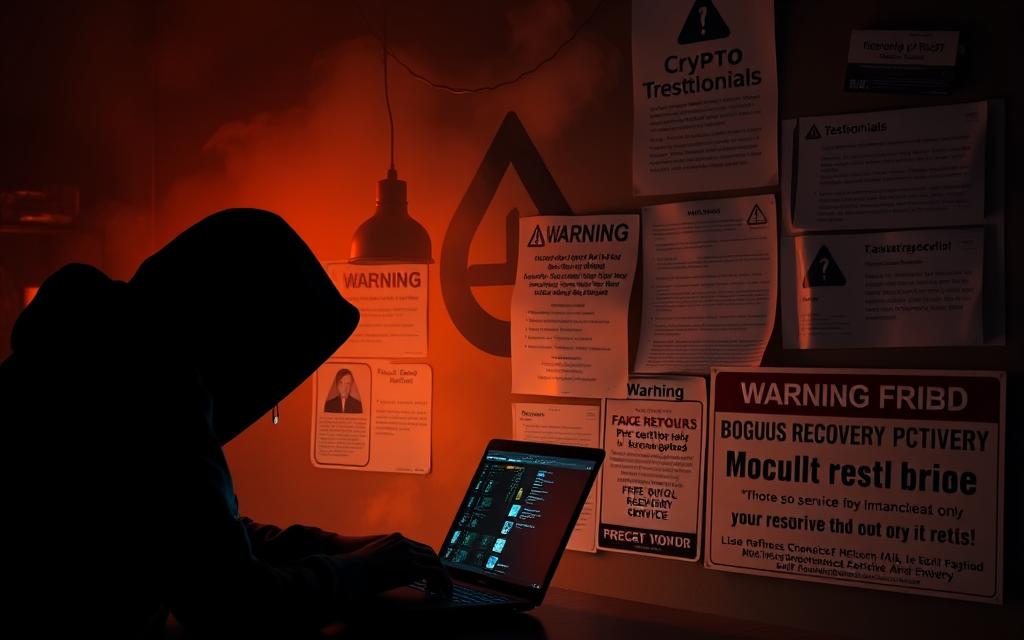Table of Contents
The rise of cryptocurrency has led to an alarming increase in theft and loss, with billions of dollars lost annually.
In response, crypto recovery services have emerged, claiming to help victims recover their digital assets. However, the legitimacy of these services is often questionable.
Victims of cryptocurrency theft are caught between the desperation to recover their lost funds and the uncertainty about which recovery services to trust.
This article aims to explore the legitimacy of crypto recovery experts and the methods they use, shedding light on the challenges posed by the decentralized nature of blockchain technology.
Understanding Cryptocurrency Loss and Recovery Challenges
Understanding the nature of cryptocurrency transactions is crucial for grasping the difficulties in recovering lost funds. Cryptocurrency transactions are recorded on a public ledger known as the blockchain, which provides a transparent and immutable record of all transactions.
The Unique Nature of Cryptocurrency Transactions
Cryptocurrency transactions differ significantly from traditional banking transactions due to the fundamental properties of blockchain technology. The decentralized and immutable nature of blockchain creates unique challenges for recovery efforts. Transactions are pseudonymous, making it difficult to identify perpetrators. Moreover, once transactions are confirmed on the blockchain, they cannot be reversed due to the technical architecture of the blockchain.
Common Ways People Lose Their Crypto Assets
People lose their crypto assets through various means, including scams, phishing attacks, exchange hacks, lost private keys, and hardware failures. The pseudonymous nature of crypto transactions complicates the identification of perpetrators. For instance, a report by Chainalysis found that in 2022, over $1 billion was lost to cryptocurrency theft.
“The rise of cryptocurrency has also seen a corresponding increase in sophisticated scams and theft methods, making recovery challenging.”
Why Recovery Is Difficult: Decentralization and Irreversibility
The decentralization of cryptocurrencies means that there is no central authority to turn to for reversing transactions or recovering lost assets. Transactions are irreversible once confirmed on the blockchain, making recovery efforts difficult. According to a report by Dynamis LLP, the cross-border nature of cryptocurrency crime further complicates jurisdiction and enforcement.
| Challenge | Description | Impact on Recovery |
|---|---|---|
| Decentralization | Lack of central authority | Difficult to reverse transactions |
| Irreversibility | Transactions cannot be reversed | Permanent loss if not recovered |
| Pseudonymity | Difficulty in identifying perpetrators | Challenging to track stolen assets |
Losing access to private keys often results in the permanent loss of assets, highlighting the importance of secure key management. Victims of crypto loss are also vulnerable to secondary scams, further complicating recovery efforts.
Legitimate Crypto Recovery Experts: What They Can Actually Do

Crypto recovery has become a specialized field, with experts providing technical, legal, and forensic services to help individuals regain access to their digital assets. The complexity of cryptocurrency transactions and the security measures in place can sometimes lead to situations where individuals lose access to their funds.
Technical Recovery Services: Lost Keys and Damaged Hardware
Technical recovery services are crucial for individuals who have lost access to their cryptocurrency due to lost keys, damaged hardware, or corrupted wallets. Specialized data recovery experts use advanced techniques to extract private keys from damaged devices, helping individuals recover their assets. These services are particularly useful in cases where the hardware has been physically damaged, such as water or fire damage, and the data is still recoverable.
Legal Approaches to Cryptocurrency Recovery
Legitimate law firms specializing in cryptocurrency recovery use various legal approaches to assist individuals in recovering their lost or stolen assets. These approaches include civil litigation against parties responsible for the loss, such as exchanges or hackers. Law firms work closely with exchanges and other relevant parties to freeze or recover stolen assets. The legal process involves gathering evidence, filing claims, and negotiating with involved parties to achieve the best possible outcome.
Forensic Blockchain Analysis Capabilities
Forensic blockchain analysis is a powerful tool used by legitimate crypto recovery experts to trace and track cryptocurrency movements across the blockchain. This involves analyzing transaction patterns, identifying addresses associated with stolen funds, and tracking the flow of cryptocurrency through various exchanges and wallets. By doing so, experts can help identify the perpetrators and assist in recovering stolen assets in collaboration with law enforcement agencies.
The process of recovering lost cryptocurrency is complex and involves a combination of technical, legal, and forensic services. Legitimate recovery experts work closely with individuals to understand their specific situations and develop tailored strategies for recovery. While there are no guarantees of success, the expertise and resources provided by these professionals significantly improve the chances of recovering lost or stolen cryptocurrency.
Red Flags: How to Identify Crypto Recovery Scams
Identifying crypto recovery scams requires knowledge of their common tactics and red flags. As the cryptocurrency market continues to grow, so does the number of scams targeting victims who have already lost money. Being aware of these red flags is crucial for protecting oneself and one’s assets.
Upfront Fee Requests and Payment Demands
One of the most significant indicators of a crypto recovery scam is the request for upfront fees or payment demands. Legitimate recovery services typically do not ask for payment before providing any service. Scammers, however, often demand payment via untraceable means, such as cryptocurrencies, making it difficult for victims to recover their losses.
Unrealistic Promises and Success Guarantees
Scammers often lure victims with unrealistic promises and guaranteed success rates. Legitimate recovery services understand the complexities involved in recovering lost cryptocurrencies and are cautious with their promises. Any service guaranteeing a 100% success rate is likely a scam.
Requests for Sensitive Information and Wallet Access
Another red flag is when recovery services ask for sensitive information or wallet access. Providing such information can lead to further loss. Legitimate services do not require access to your wallet or sensitive personal information to initiate the recovery process.
Fake Testimonials and Success Stories
Scammers often fabricate testimonials and success stories to appear legitimate. It’s essential to verify these claims through independent means. Checking for reviews on multiple platforms and seeking recommendations from trusted sources can help identify potential scams.
| Red Flag | Description |
|---|---|
| Upfront Fees | Requests for payment before service |
| Unrealistic Promises | Guaranteed success rates |
| Sensitive Information | Requests for wallet access or personal info |
| Fake Testimonials | Fabricated success stories |

By being aware of these red flags and understanding the tactics used by scammers, individuals can better protect themselves against crypto recovery scams. Always research thoroughly and remain cautious when dealing with recovery services.
The Real Crypto Recovery Process: What to Expect
Recovering stolen cryptocurrency requires a comprehensive approach that involves technical expertise and legal collaboration. Legitimate crypto recovery services use a combination of technical analysis and legal interventions to recover stolen digital assets.

Initial Case Assessment and Documentation
A thorough initial case assessment is crucial for determining the viability of recovery efforts. This involves gathering all relevant information, including transaction records and wallet addresses. Proper documentation is essential for building a strong case.
The assessment process typically includes analyzing the circumstances surrounding the loss, identifying potential recovery avenues, and determining the most effective strategies for recovery.
Blockchain Tracing and Transaction Analysis
Professional blockchain analysis is used to trace cryptocurrency movements and identify potential recovery points. This involves examining transaction patterns and following the digital trail to locate the stolen assets.
By analyzing blockchain data, recovery experts can identify patterns and connections that may lead to the recovery of stolen cryptocurrency.
Legal Interventions and Law Enforcement Collaboration
Legitimate recovery experts collaborate with law enforcement agencies and exchanges to facilitate the recovery process. This may involve filing civil litigation or criminal complaints to recover stolen assets.
Law enforcement collaboration is critical in cases where cryptocurrency has been stolen or laundered through complex networks.
Realistic Timeframes and Success Rates
Recovery attempts can take months or longer, depending on the complexity of the case. Success rates vary depending on the circumstances surrounding the loss, with some cases resulting in full recovery and others resulting in partial or no recovery.
It’s essential to have realistic expectations when working with a crypto recovery service, as the process can be lengthy and challenging.
Steps to Take If You’ve Lost Cryptocurrency
Discovering that you’ve lost cryptocurrency can be a distressing experience, but knowing the right steps to take can significantly improve your chances of recovery. Losing cryptocurrency can happen due to various reasons such as fraud, scam, or simply misplacing your wallet credentials. The key to effective recovery lies in acting quickly and making informed decisions.
Immediate Actions After Discovering Loss
The first step after discovering a loss is to remain calm and assess the situation. Document every detail related to the loss, including transaction IDs, wallet addresses, and the amount lost. This information is crucial for any recovery efforts. According to a recent report, “The faster you react to a cryptocurrency scam, the higher the chances of recovering your lost assets.” Immediate action and thorough documentation are vital.
Reporting to Exchanges and Authorities
If your cryptocurrency was lost due to a scam or theft, it’s essential to report the incident to the relevant cryptocurrency exchanges and authorities. Exchanges may be able to freeze the stolen funds if reported promptly. You should also file a complaint with the FBI’s Internet Crime Complaint Center (IC3), as they track and investigate cryptocurrency-related crimes. Reporting incidents helps law enforcement agencies to take action against fraud and scam operations.
Working with Legitimate Recovery Services
If you decide to seek professional help for recovering your lost cryptocurrency, it’s crucial to vet potential recovery services carefully. Look for services with a proven track record and transparent practices. Be wary of services that demand upfront fees or guarantee unrealistic results, as these are common traits of scams. A legitimate recovery service will provide clear guidance and work collaboratively with law enforcement when necessary.
Protecting Your Remaining Assets
While focusing on recovering lost cryptocurrency, don’t forget to secure your remaining assets. Update your passwords, enable two-factor authentication on all accounts, and monitor your wallets and accounts closely for any suspicious activity. “Protecting what’s left is just as important as recovering what’s lost,” emphasizes the need for enhanced security measures.
Conclusion: Protecting Your Crypto Assets in a Decentralized World
The reality of cryptocurrency recovery is a nuanced issue that requires careful consideration. While crypto recovery experts can help in certain situations, their capabilities are limited by the decentralized and irreversible nature of cryptocurrency transactions.
Prevention remains the best strategy for protecting digital assets. To secure your cryptocurrency holdings, it’s essential to use strong passwords, enable two-factor authentication, and store assets in reputable wallets. For those who have lost cryptocurrency, taking prompt action and working with legitimate recovery services can maximize the chances of recovery. Be cautious of recovery scams by watching for red flags such as upfront fee requests and unrealistic promises.
As the cryptocurrency industry evolves, regulatory developments may impact recovery options. Staying informed about these changes is crucial. For more information on trustworthy recovery services, visit our list of top recovery experts for cryptocurrency. By balancing the benefits of decentralization with prudent risk management, you can better protect your assets and navigate the challenges of cryptocurrency ownership.
FAQ
What are the chances of recovering lost cryptocurrency?
The likelihood of recovering lost cryptocurrency depends on various factors, including the circumstances of the loss, the type of wallet or exchange used, and the effectiveness of the recovery services employed.
How do legitimate recovery services work?
Legitimate recovery services typically employ a combination of technical, legal, and forensic approaches to track and recover lost or stolen cryptocurrency, often collaborating with law enforcement agencies and utilizing blockchain analysis capabilities.
What are the common reasons for cryptocurrency loss?
Common reasons for cryptocurrency loss include forgotten or lost private keys, damaged or compromised hardware wallets, phishing scams, and fraudulent transactions on exchanges or online platforms.
How can I identify a crypto recovery scam?
Be cautious of services that demand upfront fees, promise unrealistic success rates, or request sensitive information or wallet access, as these are common red flags indicative of a scam.
What immediate actions should I take after discovering a cryptocurrency loss?
Upon discovering a loss, it’s essential to act quickly by reporting the incident to relevant authorities and exchanges, securing remaining assets, and potentially engaging with legitimate recovery services.
Can law enforcement agencies help recover stolen cryptocurrency?
Law enforcement agencies can play a crucial role in recovering stolen cryptocurrency by collaborating with recovery services and utilizing their investigative capabilities to track and freeze fraudulent transactions.
How long does the cryptocurrency recovery process typically take?
The duration of the recovery process varies depending on the complexity of the case, the effectiveness of the recovery strategies employed, and the level of cooperation from relevant parties, including law enforcement and exchanges.
Are there any measures to protect my remaining cryptocurrency assets?
To safeguard your remaining assets, consider implementing robust security measures, such as using hardware wallets, enabling two-factor authentication, and regularly monitoring your accounts for suspicious activity.









